#aaron cope
Text
The (open) web is good, actually
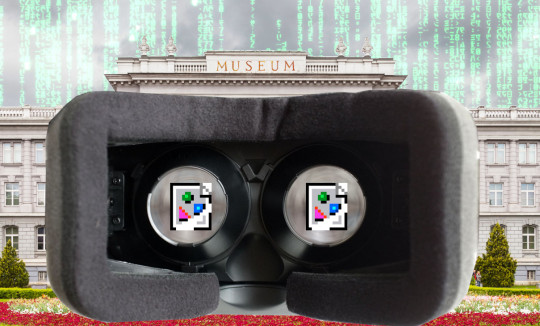
I'll be at the Studio City branch of the LA Public Library tonight (Monday, November 13) at 1830hPT to launch my new novel, The Lost Cause. There'll be a reading, a talk, a surprise guest (!!) and a signing, with books on sale. Tell your friends! Come on down!

The great irony of the platformization of the internet is that platforms are intermediaries, and the original promise of the internet that got so many of us excited about it was disintermediation – getting rid of the middlemen that act as gatekeepers between community members, creators and audiences, buyers and sellers, etc.
The platformized internet is ripe for rent seeking: where the platform captures an ever-larger share of the value generated by its users, making the service worst for both, while lock-in stops people from looking elsewhere. Every sector of the modern economy is less competitive, thanks to monopolistic tactics like mergers and acquisitions and predatory pricing. But with tech, the options for making things worse are infinitely divisible, thanks to the flexibility of digital systems, which means that product managers can keep subdividing the Jenga blocks they pulling out of the services we rely on. Combine platforms with monopolies with digital flexibility and you get enshittification:
https://pluralistic.net/2023/01/21/potemkin-ai/#hey-guys
An enshittified, platformized internet is bad for lots of reasons – it concentrates decisions about who may speak and what may be said into just a few hands; it creates a rich-get-richer dynamic that creates a new oligarchy, with all the corruption and instability that comes with elite capture; it makes life materially worse for workers, users, and communities.
But there are many other ways in which the enshitternet is worse than the old good internet. Today, I want to talk about how the enshitternet affects openness and all that entails. An open internet is one whose workings are transparent (think of "open source"), but it's also an internet founded on access – the ability to know what has gone before, to recall what has been said, and to revisit the context in which it was said.
At last week's Museum Computer Network conference, Aaron Straup Cope gave a talk on museums and technology called "Wishful Thinking – A critical discussion of 'extended reality' technologies in the cultural heritage sector" that beautifully addressed these questions of recall and revisiting:
https://www.aaronland.info/weblog/2023/11/11/therapy/#wishful
Cope is a museums technologist who's worked on lots of critical digital projects over the years, and in this talk, he addresses himself to the difference between the excitement of the galleries, libraries, archives and museums (GLAM) sector over the possibilities of the web, and why he doesn't feel the same excitement over the metaverse, and its various guises – XR, VR, MR and AR.
The biggest reason to be excited about the web was – and is – the openness of disintermediation. The internet was inspired by the end-to-end principle, the idea that the network's first duty was to transmit data from willing senders to willing receivers, as efficiently and reliably as possible. That principle made it possible for whole swathes of people to connect with one another. As Cope writes, openness "was not, and has never been, a guarantee of a receptive audience or even any audience at all." But because it was "easy and cheap enough to put something on the web," you could "leave it there long enough for others to find it."
That dynamic nurtured an environment where people could have "time to warm up to ideas." This is in sharp contrast to the social media world, where "[anything] not immediately successful or viral … was a waste of time and effort… not worth doing." The social media bias towards a river of content that can't be easily reversed is one in which the only ideas that get to spread are those the algorithm boosts.
This is an important way to understand the role of algorithms in the context of the spread of ideas – that without recall or revisiting, we just don't see stuff, including stuff that might challenge our thinking and change our minds. This is a much more materialistic and grounded way to talk about algorithms and ideas than the idea that Big Data and AI make algorithms so persuasive that they can control our minds:
https://pluralistic.net/2023/11/06/attention-rents/#consumer-welfare-queens
As bad as this is in the social media context, it's even worse in the context of apps, which can't be linked into, bookmarked, or archived. All of this made apps an ominous sign right from the beginning:
https://memex.craphound.com/2010/04/01/why-i-wont-buy-an-ipad-and-think-you-shouldnt-either/
Apps interact with law in precisely the way that web-pages don't. "An app is just a web-page wrapped in enough IP to make it a crime to defend yourself against corporate predation":
https://pluralistic.net/2023/08/27/an-audacious-plan-to-halt-the-internets-enshittification-and-throw-it-into-reverse/
Apps are "closed" in every sense. You can't see what's on an app without installing the app and "agreeing" to its terms of service. You can't reverse-engineer an app (to add a privacy blocker, or to change how it presents information) without risking criminal and civil liability. You can't bookmark anything the app won't let you bookmark, and you can't preserve anything the app won't let you preserve.
Despite being built on the same underlying open frameworks – HTTP, HTML, etc – as the web, apps have the opposite technological viewpoint to the web. Apps' technopolitics are at war with the web's technopolitics. The web is built around recall – the ability to see things, go back to things, save things. The web has the technopolitics of a museum:
https://www.aaronland.info/weblog/2014/09/11/brand/#dconstruct
By comparison, apps have the politics of a product, and most often, that product is a rent-seeking, lock-in-hunting product that wants to take you hostage by holding something you love hostage – your data, perhaps, or your friends:
https://www.eff.org/deeplinks/2021/08/facebooks-secret-war-switching-costs
When Anil Dash described "The Web We Lost" in 2012, he was describing a web with the technopolitics of a museum:
where tagging was combined with permissive licenses to make it easy for people to find and reuse each others' stuff;
where it was easy to find out who linked to you in realtime even though most of us were posting to our own sites, which they controlled;
where a link from one site to another meant one person found another person's contribution worthy;
where privacy-invasive bids to capture the web were greeted with outright hostility;
where every service that helped you post things that mattered to you was expected to make it easy for you take that data back if you changed services;
where inlining or referencing material from someone else's site meant following a technical standard, not inking a business-development deal;
https://www.anildash.com/2012/12/13/the_web_we_lost/
Ten years later, Dash's "broken tech/content culture cycle" described the web we live on now:
https://www.anildash.com/2022/02/09/the-stupid-tech-content-culture-cycle/
found your platform by promising to facilitate your users' growth;
order your technologists and designers to prioritize growth above all other factors and fire anyone who doesn't deliver;
grow without regard to the norms of your platform's users;
plaster over the growth-driven influx of abusive and vile material by assigning it to your "most marginalized, least resourced team";
deliver a half-assed moderation scheme that drives good users off the service and leaves no one behind but griefers, edgelords and trolls;
steadfastly refuse to contemplate why the marginalized users who made your platform attractive before being chased away have all left;
flail about in a panic over illegal content, do deals with large media brands, seize control over your most popular users' output;
"surface great content" by algorithmically promoting things that look like whatever's successful, guaranteeing that nothing new will take hold;
overpay your top performers for exclusivity deals, utterly neglect any pipeline for nurturing new performers;
abuse your creators the same ways that big media companies have for decades, but insist that it's different because you're a tech company;
ignore workers who warn that your product is a danger to society, dismiss them as "millennials" (defined as "anyone born after 1970 or who has a student loan")
when your platform is (inevitably) implicated in a murder, have a "town hall" overseen by a crisis communications firm;
pay the creator who inspired the murder to go exclusive on your platform;
dismiss the murder and fascist rhetoric as "growing pains";
when truly ghastly stuff happens on your platform, give your Trust and Safety team a 5% budget increase;
chase growth based on "emotionally engaging content" without specifying whether the emotions should be positive;
respond to ex-employees' call-outs with transient feelings of guilt followed by dismissals of "cancel culture":
fund your platforms' most toxic users and call it "free speech";
whenever anyone disagrees with any of your decisions, dismiss them as being "anti-free speech";
start increasing how much your platform takes out of your creators' paychecks;
force out internal dissenters, dismiss external critics as being in conspiracy with your corporate rivals;
once regulation becomes inevitable, form a cartel with the other large firms in your sector and insist that the problem is a "bad algorithm";
"claim full victim status," and quit your job, complaining about the toll that running a big platform took on your mental wellbeing.
https://pluralistic.net/2022/02/18/broken-records/#dashes
The web wasn't inevitable – indeed, it was wildly improbable. Tim Berners Lee's decision to make a new platform that was patent-free, open and transparent was a complete opposite approach to the strategy of the media companies of the day. They were building walled gardens and silos – the dialup equivalent to apps – organized as "branded communities." The way I experienced it, the web succeeded because it was so antithetical to the dominant vision for the future of the internet that the big companies couldn't even be bothered to try to kill it until it was too late.
Companies have been trying to correct that mistake ever since. After three or four attempts to replace the web with various garbage systems all called "MSN," Microsoft moved on to trying to lock the internet inside a proprietary browser. Years later, Facebook had far more success in an attempt to kill HTML with React. And of course, apps have gobbled up so much of the old, good internet.
Which brings us to Cope's views on museums and the metaverse. There's nothing intrinsically proprietary about virtual worlds and all their permutations. VRML is a quarter of a century old – just five years younger than Snow Crash:
https://en.wikipedia.org/wiki/VRML
But the current enthusiasm for virtual worlds isn't merely a function of the interesting, cool and fun experiences you can have in them. Rather, it's a bid to kill off whatever is left of the old, good web and put everything inside a walled garden. Facebook's metaverse "is more of the same but with a technical footprint so expensive and so demanding that it all but ensures it will only be within the means of a very few companies to operate."
Facebook's VR headsets have forward-facing cameras, turning every users into a walking surveillance camera. Facebook put those cameras there for "pass through" – so they can paint the screens inside the headset with the scene around you – but "who here believes that Facebook doesn't have other motives for enabling an always-on camera capturing the world around you?"
Apple's VisionPro VR headset is "a near-perfect surveillance device," and "the only thing to save this device is the trust that Apple has marketed its brand on over the last few years." Cope notes that "a brand promise is about as fleeting a guarantee as you can get." I'll go further: Apple is already a surveillance company:
https://pluralistic.net/2022/11/14/luxury-surveillance/#liar-liar
The technopolitics of the metaverse are the opposite of the technopolitics of the museum – even moreso than apps. Museums that shift their scarce technology budgets to virtual worlds stand a good chance of making something no one wants to use, and that's the best case scenario. The worst case is that museums make a successful project inside a walled garden, one where recall is subject to corporate whim, and help lure their patrons away from the recall-friendly internet to the captured, intermediated metaverse.
It's true that the early web benefited from a lot of hype, just as the metaverse is enjoying today. But the similarity ends there: the metaverse is designed for enclosure, the web for openness. Recall is a historical force for "the right to assembly… access to basic literacy… a public library." The web was "an unexpected gift with the ability to change the order of things; a gift that merits being protected, preserved and promoted both internally and externally." Museums were right to jump on the web bandwagon, because of its technopolitics. The metaverse, with its very different technopolitics, is hostile to the very idea of museums.
In joining forces with metaverse companies, museums strike a Faustian bargain, "because we believe that these places are where our audiences have gone."
The GLAM sector is devoted to access, to recall, and to revisiting. Unlike the self-style free speech warriors whom Dash calls out for self-serving neglect of their communities, the GLAM sector is about preservation and access, the true heart of free expression. When a handful of giant companies organize all our discourse, the ability to be heard is contingent on pleasing the ever-shifting tastes of the algorithm. This is the problem with the idea that "freedom of speech isn't freedom of reach" – if a platform won't let people who want to hear from you see what you have to say, they are indeed compromising freedom of speech:
https://pluralistic.net/2022/12/10/e2e/#the-censors-pen
Likewise, "censorship" is not limited to "things that governments do." As Ada Palmer so wonderfully describes it in her brilliant "Why We Censor: from the Inquisition to the Internet" speech, censorship is like arsenic, with trace elements of it all around us:
https://www.youtube.com/watch?v=uMMJb3AxA0s
A community's decision to ban certain offensive conduct or words on pain of expulsion or sanction is censorship – but not to the same degree that, say, a government ban on expressing certain points of view is. However, there are many kinds of private censorship that rise to the same level as state censorship in their impact on public discourse (think of Moms For Liberty and their book-bannings).
It's not a coincidence that Palmer – a historian – would have views on censorship and free speech that intersect with Cope, a museum worker. One of the most brilliant moments in Palmer's speech is where she describes how censorship under the Inquistion was not state censorship – the Inquisition was a multinational, nongovernmental body that was often in conflict with state power.
Not all intermediaries are bad for speech or access. The "disintermediation" that excited early web boosters was about escaping from otherwise inescapable middlemen – the people who figured out how to control and charge for the things we did with one another.
When I was a kid, I loved the writing of Crad Kilodney, a short story writer who sold his own self-published books on Toronto street-corners while wearing a sign that said "VERY FAMOUS CANADIAN AUTHOR, BUY MY BOOKS" (he also had a sign that read, simply, "MARGARET ATWOOD"). Kilodney was a force of nature, who wrote, edited, typeset, printed, bound, and sold his own books:
https://www.theglobeandmail.com/arts/books/article-late-street-poet-and-publishing-scourge-crad-kilodney-left-behind-a/
But there are plenty of writers out there that I want to hear from who lack the skill or the will to do all of that. Editors, publishers, distributors, booksellers – all the intermediaries who sit between a writer and their readers – are not bad. They're good, actually. The problem isn't intermediation – it's capture.
For generations, hucksters have conned would-be writers by telling them that publishing won't buy their books because "the gatekeepers" lack the discernment to publish "quality" work. Friends of mine in publishing laughed at the idea that they would deliberately sideline a book they could figure out how to sell – that's just not how it worked.
But today, monopolized film studios are literally annihilating beloved, high-priced, commercially viable works because they are worth slightly more as tax writeoffs than they are as movies:
https://deadline.com/2023/11/coyote-vs-acme-shelved-warner-bros-discovery-writeoff-david-zaslav-1235598676/
There's four giant studios and five giant publishers. Maybe "five" is the magic number and publishing isn't concentrated enough to drop whole novels down the memory hole for a tax deduction, but even so, publishing is trying like hell to shrink to four:
https://pluralistic.net/2022/11/07/random-penguins/#if-you-wanted-to-get-there-i-wouldnt-start-from-here
Even as the entertainment sector is working to both literally and figuratively destroy our libraries, the cultural heritage sector is grappling with preserving these libraries, with shrinking budgets and increased legal threats:
https://blog.archive.org/2023/03/25/the-fight-continues/
I keep meeting artists of all description who have been conditioned to be suspicious of anything with the word "open" in its name. One colleague has repeatedly told me that fighting for the "open internet" is a self-defeating rhetorical move that will scare off artists who hear "open" and think "Big Tech ripoff."
But "openness" is a necessary precondition for preservation and access, which are the necessary preconditions for recall and revisiting. Here on the last, melting fragment of the open internet, as tech- and entertainment-barons are seizing control over our attention and charging rent on our ability to talk and think together, openness is our best hope of a new, good internet. T
he cultural heritage sector wants to save our creative works. The entertainment and tech industry want to delete them and take a tax writeoff.
As a working artist, I know which side I'm on.

If you'd like an essay-formatted version of this post to read or share, here's a link to it on pluralistic.net, my surveillance-free, ad-free, tracker-free blog:
https://pluralistic.net/2023/11/13/this-is-for-everyone/#revisiting

Image:
Diego Delso (modified)
https://commons.wikimedia.org/wiki/File:Museo_Mimara,_Zagreb,_Croacia,_2014-04-20,_DD_01.JPG
CC BY-SA 4.0
https://creativecommons.org/licenses/by-sa/4.0/
#pluralistic#ar#xr#vr#augmented reality#extended reality#virtual reality#museums#cultural preservation#aaron cope#Museum Computer Network#cultural heritage#glam#access#open access#revisiting#mr#mixed reality#asynchronous#this is for everyone#freedom of reach#gatekeepers#metaverse#technofeudalism#privacy#brick on the face#rent-seeking
185 notes
·
View notes
Text

#bullet train#just me making memes to cope#brian tyree henry#tangerine#lemon#tangerine and lemon#the twins bullet train#aaron taylor johnson#ill never be the same after this movie
4K notes
·
View notes
Text
Brendan is who people think Dante is (Mystreet)
Brendan two timed Nana and Lucinda, helped her out only because he had interest in getting with her and dating her, and only started working at the beach so he can see her in a bathing suit, he objectified her and was a creep.
Meanwhile Dante canonically hasn’t been on a date since Highschool most likely since Nana, genuinely enjoyed spending time with Nana, comforted her after seeing her cry and offered to help her rebuild the house after it burned down, even offering her a place to stay, in love love paradise he was eating brunch with her and Lucinda and just hanging out as friends, helped her set decorations up, without the intent of wanting to date her or objectifying her, he just enjoyed spending time with her cause he genuinely liked her as a person. :)
#Garroth confirmed Dante hasn’t been on a date since Highschool that’s like 10+ years csnonically#debunking the womaniser#Dancole wasn’t a relationship nor official Jess just wanted a stupid plot line cope 💀#dante aphmau#mystreet#aphverse#aphblr#minecraft diaries#aphmau dante#nana ashida#kawaii chan#danchan#Brendan aphmau#garroth ro'meave#laurence zvhal#aaron lycan#Aarmau#Dante they can never make me hate you#Garroth the man you are.. confirming that he’s innocent
94 notes
·
View notes
Photo
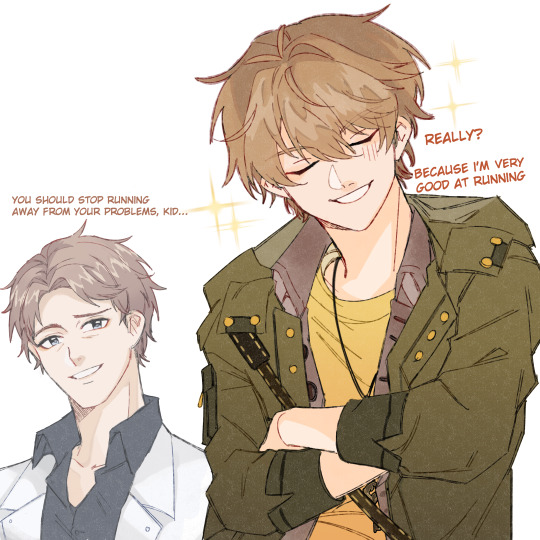

#my beloved son and dad#i have barely time due to work and school and drawing this took 3 days because i can only draw at night and not too late#i can only daydream of luke to cope#accept my silly takes though#luke pearce#tears of themis#SHAKES AARON IM SORRY ILL DO YOU JUSTICEONE DAY HE DOESNT LOOK OLD
278 notes
·
View notes
Text

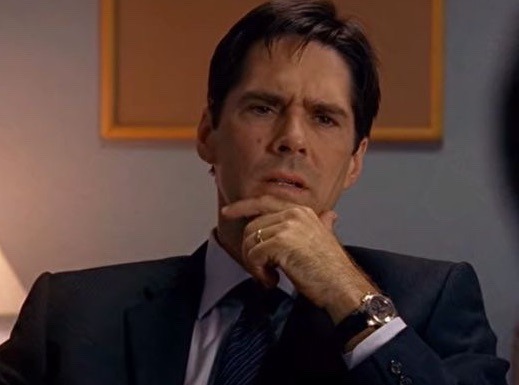
he is so breathtaking. god i love him.. so much!!!!!
35 notes
·
View notes
Text
i miss you on a train, i miss you in the morning
#this was the coping mechanism in question#in my rambo feels last night#good morning/afternoon/evening goonerinas! i hope i didn't ruin your day <3#aaron ramsey#arsenal#arsenal fc#edits!!
243 notes
·
View notes
Text
And I’m sorry I ain’t got a quick fix for my brain. All I know is… this isn’t working.


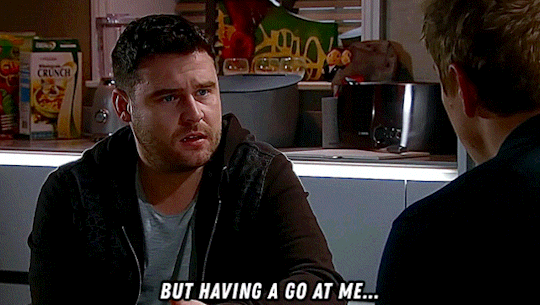

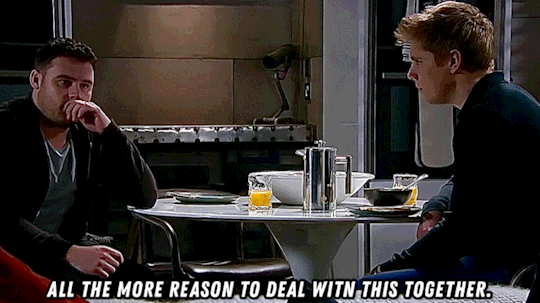





25-Jan-2019
#robron#robert sugden#aaron dingle#robert and aaron focus#it’s all about billy and aaron not coping especially seeing him#deal with this together#no quick fix#i hate this more than you can imagine#i’d murder a brew#we’ll sort this#20190125#201901#robron episodes 2019
16 notes
·
View notes
Text
When the ‘harm reduction’ choice is the complete and utter extermination of an entire people and culture, I think you’ve lost the plot.
#anarchism#just get tired seeing libs coping all the time#anti capitalism#free palestine#aaron bushnell#genocide
9 notes
·
View notes
Text
Living with the twins was a nightmare.
They didn't clean, didn't do laundry, left their shit all over the place, didn't even change the toilet paper...
Nicky had to be running up and down during his scarce free time playing housemaid because these kids he loved with all his heart were an absolute and complete disaster. Nicky himself wasn't much better. At least he'd learn a few things from living with Erik.
So the years went by and stayed the same.
They arrived at Palmetto and Nicky still had to be running behind them cleaning disaster after disaster, trying to keep the place clean.
Anyone would've thought that having an Exy superstar joining them would help, but not at all. Kevin sharing the dorm with them only meant more shit to clean for Nicky because it turns out that the Ravens, for all they suffer, are still too superior to wash a dish.
And so it went until Katelyn came and Aaron started to help. It wasn't much, it wasn't great, but he put some effort even if she would never see it. Or maybe it was her doing?
Then Kevin realized at some point that his hands weren't going to fall off if he took his laundry from the floor.
Nicky took this in gleeful silence, screaming internally in joy, texting the girls to settle the ongoing bets about the monsters cleaning habits and waited to see if by any chance, he was worthy of another miracle and Andrew would finally change.
As it turns out, Neil Josten had one more trick up his sleeve to perform before giving peace to the Foxes.
Nicky couldn't quite believe his eyes that first morning after Andrew changed rooms with Neil and Aaron. Nicky was exhausted after everything that had happened in the year and overslept just to wake up in a parallel world.
Three mugs in the dishwasher, no underwear on the floor. Paper roll in the bathroom.
Just like when Aaron fell in love, it wasn't much, it wasn't great, but it was enough.
Nicky was certain now that his twins would be alright.
#roomies are a nightmare#so i got cheesy#and make it aftg because ain't not better way to cope#aftg#all for the game#neil josten#andrew minyard#the foxhole court#aftg fandom#aaron minyard#aftg headcanon#aftg hc
49 notes
·
View notes
Text
Aaron Hotchner- Oneshot (Criminal Minds) Extra
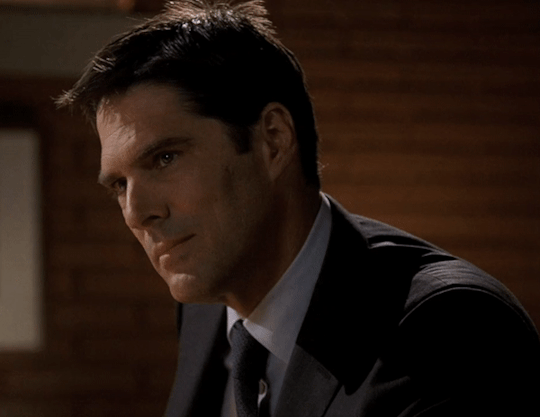
It took about two months for you to be cleared. Technically you were up and running a month ago, but Hotch refused to let you back into the field until he was certain you were alright.
What bothered him wasn’t your quick recovery back into the bureau. But you’d passed every evaluation. Given your record, it wasn’t surprising. You were fully equipped to trick the system if you needed to. So he placed it upon himself to keep an eye out. Nothing appeared out of the ordinary.
Not even this case seems to phase you.
Rossi and Prentiss had given their own little observations as they watched you review the file on the plane.
“She seems alright. If I had to say, she’s more focused. Vigilant.” Rossi comments.
That’s what worried him.
Was your vigilance merely a mask to hide that trauma? You were shot. Then you watched the very man who attacked you get shot down right before your eyes. You must have picked up on his stare, because you looked up. You held his gaze for a few seconds before looking away.
He decided not to dwell on it.
~~~
“We’ll give you whatever you need to catch this scumbag.”
The Texas Police Department was completely on board. Hotch knew in cases like this, sometimes the local officers often got in the way.
“Can you show us what you have?” The detective nodded.
“Right this way.” He led them to the conference room. The sight of the victims taped to the wall. Reid stepped forward, and you were right next to him.
“All brunette.” Reid spoke.
“With the same first and last initials.” You commented. You both exchanged a look, one that the team had grown used to from Reid whenever he made a breakthrough.
“What is it?” Hotch questioned.
“He’s killing in alphabetical and numerical order.” You and Reid said simultaneously.
The detectives present just wore slight looks of confusion. You sent Reid a small smile which he returned.
“We should make a list of women within a ten mile radius with similar initials and birthdates that closely collaborate.” Reid advises.
“He’s too sloppy, he’s been killing in his area, there’s a good chance all these women were connected, or he knew them in some way or another. “ You add.
Hotch wastes no time. Everyone falls out, taking up other tasks while you get busy yourself. Reid is formulating a geographical profile, and you step into the office, to grab a stack of files to make some kind of connection. Hotch is in the room on the phone, possibly talking to Garcia from his facial expression.
“Thanks Garcia.”
You were right. Eyes directed on the papers, Hotch slips his phone into his pocket as he stands there, watching you. It goes unnoticed at first, but then you pick up on it, and you look over.
“Ummm, sir?”
“How are you?”
You’re not even surprised by the question.
“I was cleared for duty.”
“That’s not what I asked.”
You close your eyes, letting out a breath.
“I’m fine.”
You try to give nothing away. But Hotch has been doing this long enough. Of course he can spot it. It’s clear that you’re not ready to talk.
For the next couple days, you all do your best to catch the unsub. When it was time to make an arrest, Hotch didn’t miss the hesitance you showed to follow them.
“(Y/N). Hang back.”
Everyone noticed the manner you looked at him. It was as if the both of you were having some kind of silent conversation. You didn’t argue. Just followed his order. The rest of the team along with a few officers and the lead detectives were heading out.
You had a feeling you knew how this would play out. This man is taking revenge. So trying to reason would be difficult. But if anyone could do it, your team would. That’s why when the man is finally apprehended and you see them on the news, You’re not surprised. The officers were exchanging relieved looks as a few walked over to shake your hand for a job well done. Your gaze drifted back to the television screen. For the first time since you started the case, you felt relaxed.
When you were all on the jet, taking off to Quantico, everyone was invested in their own little tasks. Reid was reading a book. Morgan listened to his tracks. JJ was snacking on her cheetos and Prentiss seemed to be in an intense game of chess with Rossi. You barely said a word. Since you were all set to get back just in time for dinner, Rossi invited everyone to his house for a nice meal. It was well deserved after that stressful case.
The moment the jet landed, everyone was eager for dinner. So after picking up Garcia, everyone made a trip to Rossi’s. Easy conversation slipped through. Stories of past flops in their lives and the office. You smiled at some of Garcia’s jokes and Morgan’s tall tales. It’s a very calm atmosphere. When the festivities begin to die down, you try to find a secluded place to gather your thoughts.
Hotch caught you admiring Rossi’s very spacious backyard. You were still adjusting to the team.
“I’m not special.”
While you got along well with everyone. There was a part of you that thought you had no right to be there.
“All of you worked hard to get where you are. I got shot in the head and came back with super powers. “ You let out a dry laugh.
“If I can even call it that. These headaches are hell in itself. But hey, at least I’m alive right.”
“Not every case will have a happy ending.”
“Don’t patronize me, I’m not some child. You think I’m that naive.” Your tone is bitter. Hotch has learned that you tend to become hostile when you feel helpless.
“For five months I played dumb teasers and word puzzles when I could have been protecting people. Saving people. “
“You can’t expect to save everyone.”
“WHY CAN’T I!!”
Your yell was expected. You caught yourself, looking down at your shoes. You had not intended to lose your temper, especially in front of him, but the pain in your chest wouldn’t leave.
“Survivors' guilt.”
That’s all he said, and you wiped the side of your cheek when the stray tear fell. Because it feels a bit unfair. You’ve managed to evade death not once, but twice.
“You survived that shooting, but two others died. A man and a woman with less fatal injuries. You blame yourself.”
“It’s my fault. They probably had ten doctors in my room. What about those two! Why didn’t they help them first? I was a lost cause!!”
“You weren’t.”
You let out a scoff, because you know he’s about to spout some fortune cookie nonsense. But he doesn’t. Hotch takes a step closer, and you hold your breath at the way his eyes bore into you.
“You’re important.” His tone is much softer.
This is more than just simple reassurance. When his thumb wipes your tear stained cheek, it’s one of the few times since your accident that your brain isn’t going a mile a minute. It’s all so quiet now.
“You’re special.”
Your lips quiver at his words.
This is not what you expected at all.
#aaron hotchner#trust#love#family#Genius#accidents#aaron x reader#care#derek morgan#spencer reid#cases#crime#bau#profilers#hardtruths#coping#guilt#new beginnings#jj#david rossi#emotions
28 notes
·
View notes
Text

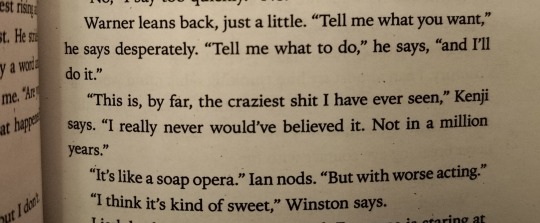
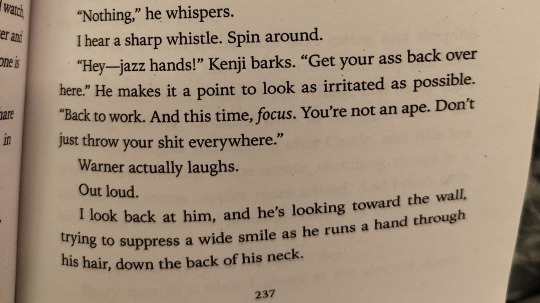

Kenji Kishimoto should be protected at all cost 🥹
#I have been laughing at this for ages#and yea peacocks about to mate like my boi has good coping mechanisms to define terminology for his own death#bsd kenji#aaron warner#juliette ferrars#shattered glass#ignite me#tahereh mafi
9 notes
·
View notes
Text

I am so obnoxious /hj
26 notes
·
View notes
Text
does no one remember that ep after haley died where aaron was like yea she’ll know i’m going back (to the BAU) i’m sorry after everything she went thru i would haunt that bitch forever lmaooo (the haley hotchner antis are pissing me off i’m just gonna become a haley stan acc atp)
10 notes
·
View notes
Text
we never kiss because her gloss is the consistency of sauce and it gets all over stuff. it’s like frosting. she’s exhausting 😔😔😔😔😔
3 notes
·
View notes
Text
AARON TURNED 40!!

#aaron albano#demarius copes#julian deguzman#john michael fiumara#jess leprotto#tommy bracco#brendon stimson#newsies#newsies broadway#I’m so crying rn#newsies archive
20 notes
·
View notes
Text
I hate this because I've been watching emmerdale happily for a year and a half without any fixation other than my love and devotion to charity and mack so why do this. why now. why ever.
#it was bad when he returned last year but it was only for a few weeks so i could cope. now i have to deal with angry aaron full time. ugh.#danny's return 2023
3 notes
·
View notes